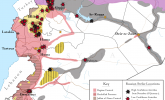Russian Airstrikes in Syria: January 8 - 14, 2016
January 15, 2016 - Genevieve Casagrande


Russia continues to pursue expanded influence through military and economic partnerships as its own economy suffers under collapsing oil prices. Russian Deputy Prime Minister Dmitry Rogozin revealed that Russia is conducting negotiations with Serbia to provide advanced defensive weaponry during a visit to Belgrade. Russian state media reported that Serbia had requested the Russian S-300 long-range surface-to-air missile system, a defense upgrade Rogozin claimed was justified by new threats facing its Balkan ally from NATO member Croatia.


Rival Shi’a political factions are capitalizing on increased instability in Basra to compete for influence.

ISIS’s affiliates in Libya and Pakistan gained new supporters and expanded attack zones in December 2015. ISIS’s largely dormant affiliates in Algeria and Russia’s North Caucasus region also conducted rare attacks, potentially signaling a renewal of ISIS activity in those areas. Each of these affiliate campaigns give ISIS resiliency outside of Iraq and Syria.
ISIS’s affiliates in Libya and Pakistan gained new supporters and expanded attack zones in December 2015. ISIS’s largely dormant affiliates in Algeria and Russia’s North Caucasus region also conducted rare attacks, potentially signaling a renewal of ISIS activity in those areas. Each of these affiliate campaigns give ISIS resiliency outside of Iraq and Syria.

The tempo of Russian air operations slowed considerably from January 4 - 7. ISW was only able to confirm 17 locations of Russian airstrikes during the reporting period, the lowest volume of Russian strikes since early October 2015. The cause of this decrease currently remains unclear; as the lull may have been caused by changing weather conditions, shifts in Russian posturing inside Syria, or deferred maintenance activities following several weeks of heavy Russian airstrikes.

The ISF made significant gains in Ramadi in December, clearing much of the city center and recapturing the government complex on December 28.

Russia heightened its confrontation with the U.S. and its allies beyond conventional military aggression, conducting information, economic, and possible cyber operations. President Vladimir Putin instituted a new national security strategy outlining Russia’s primary security objectives and threats. Russia accused the U.S. and its partners of conducting multimodal warfare in an effort to contain Russia’s resurgence as a great power, a core objective in its updated strategy. Moscow also suggested that U.S.
